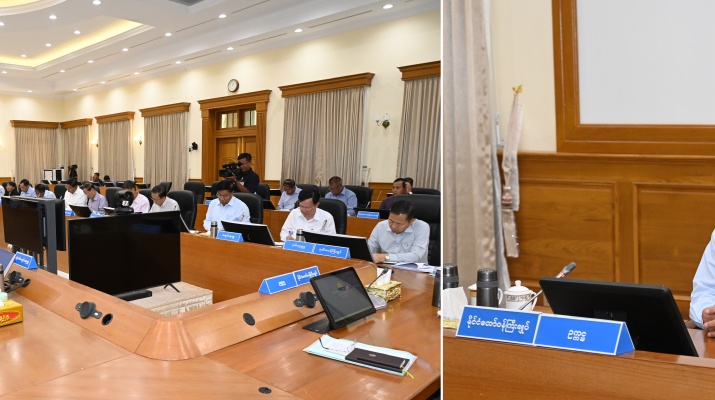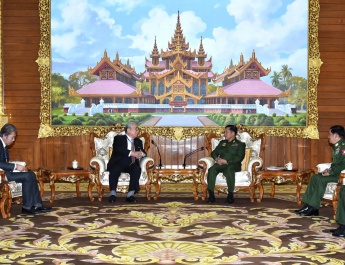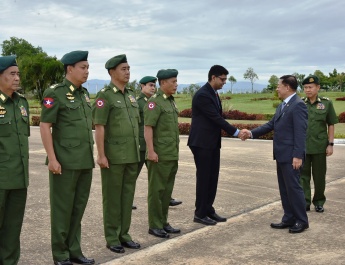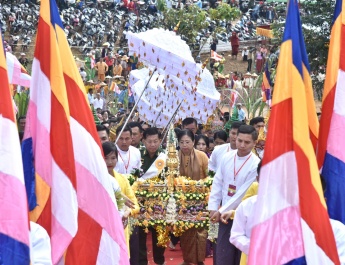NAY PYI TAW April 18
The Union government of the Republic of the Union of Myanmar held a work coordination meeting at State Administration Council Chairman’s Office this afternoon, addressed by Chairman of State Administration Council Prime Minister Senior General Min Aung Hlaing.
Also present were Vice Chair-man of State Administration Council Deputy Prime Minister Vice-Senior General Soe Win, SAC Secretary General Aung Lin Dway, SAC Joint Secretary General Ye Win Oo, SAC mem-bers, union level dignitaries, union ministers, and officials.
In his address, the Senior General said he had inspected the ministry buildings damaged by the earthquake this morning. Regular office work must be in the process when all offices are reopened. Financial assistance for damaged buildings of the people is underway.
Basic education schools must be repaired in time
Schools must be repaired at the earliest possible time for the school children to attend classes as soon as the new academic year starts. In repairing schools, their structural strength and quality must be examined through systematic supervision. Of the damaged hospitals, some need special care in repairing them.
Damaged departmental buildings must be turned into earthquake resistant structures
As regards the damaged government buildings in Nay Pyi Taw, the ones that were in the landfill area suffered a greater degree of destruction. Hence, soil testing must come first in
repair or reconstruction under-takings. Buildings situated on the fault line must be relocated. Nay Pyi Taw town plan must be redrawn based on new surveys and calculations and building designs and methods of the earthquake prone countries must be used as an example.
Systematic research must be conducted on the earth-affected areas where the underground fault line passes through and the reconstruction process must be carried out with earthquake resistance in mind. Engineering point of view must always be taken into account and all structures must meet the required standard to withstand earthquakes. In repairing or rebuilding offices, priority must be given to the ones that faced only minor damages, and the work must begin according to the set rules only after completion of necessary examinations by engineers.
All reconstructed staff housing quarters must have the power to withstand earthquakes up to the magnitude 8 on the Richter scale. All round care must be provided for the safety and convenience of civil servants living in temporary residences. Only the double-unit temporary dwellings must be built and adequate water and electricity supply must be ensured.
Upgrading Railway and Highway Networks
With regard to railway and highway infrastructure, it is essential to implement detailed measures for the systematic repair and maintenance of railway lines. Additionally, inspections of bridges are necessary, along with appropriate actions to ensure safe and smooth ascents and descents on bridge approaches. It is necessary for the relevant ministries to implement a series of measures to ensure that roads meet the prescribed standards and allow for safe and smooth travel at designated speeds.Similarly, regular inspections of irrigation dams are essential, along with assessments of drainage channels to identify and address any signs of damage.
The earthquake resulted in ground dehydration in certain areas, while water seepage occurred in others. He noted that, with the onset of the summer season, it is essential to ensure adequate preparations for a sufficient water supply.
The presentations provided by relevant sectors
Subsequently, the council members, union-level officials, and union ministers who attended the meeting provided detailed explanations regarding the conditions and observations of the aftershocks following the Mandalay earthquake. They also discussed the arrival and distribution of international relief supplies, ongoing road and bridge repair efforts, and measures to ensure uninterrupted communication. Additionally, they addressed the damage to staff housing and the ongoing phased repairs, the damage to office buildings in each ministry, and the establishment of temporary hospitals that are currently providing treatment.
The Vice-Senior General then provided an explanation regarding the temporary displacement of people in the earthquake-affected areas, the accommodation of ministry employees’ families in temporary shelters, and the need to administer cholera vaccines to those residing in these shelters. He also highlighted the importance of systematically providing citizenship verification cards and household registrations for those affected by the earth-quake, as well as the use of food trucks selling food in the affected areas.
Additional instructions
Regarding the discussions and presentations, the Senior General emphasized the importance of completing the necessary tasks promptly. He stated that if all sectors work together, the challenges can be successfully overcome. Currently, those injured in the earthquake are receiving treatment at both public and military hospitals, as well as in temporary hospitals established by foreign countries. The State will continue to provide medical care and assistance to individuals seeking health services as a result of the earthquake’s impact.
He stated that rehabilitation efforts are currently underway and that international assistance is also being provided. He also stated that, during his meeting on April 17 with the Prime Minister of Malaysia —the current ASEAN Chair— in Bangkok, Thailand, it was affirmed that ASEAN would extend support.
He emphasized the importance of taking a longterm approach in the reconstruction of damaged office buildings, ensuring that they are built to be earthquake-resistant. He also noted that some of the damaged structures need to be reevaluated, as they did not meet established standards and design specifications.He concluded the meeting following these remarks.





